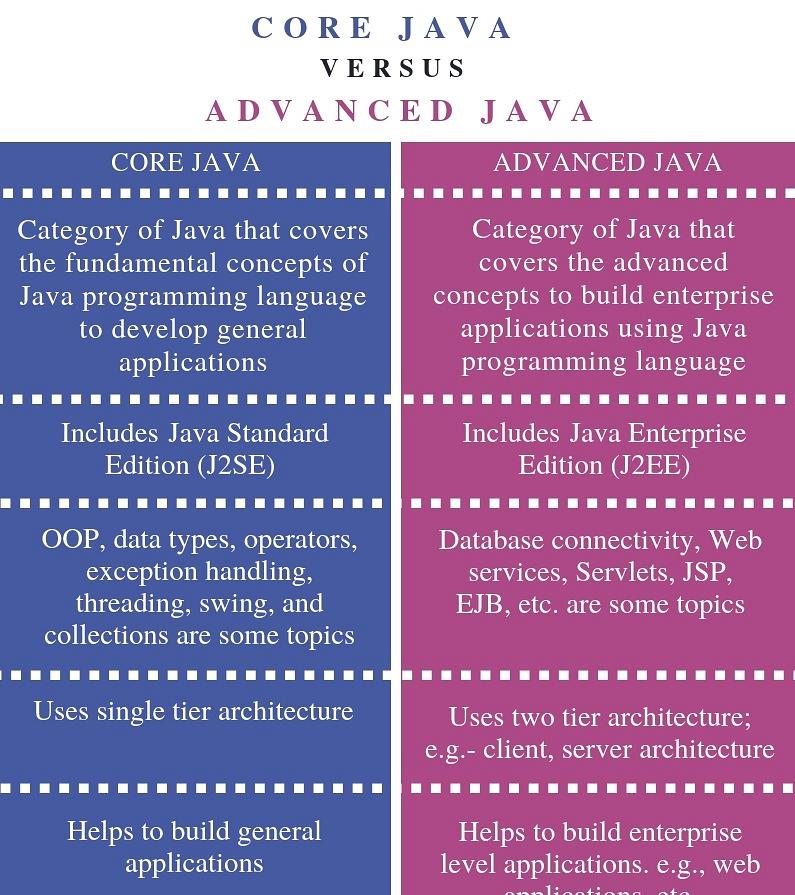What is the difference between Core Java and Advanced Java?
The main difference between Core Java and Advanced Java is that Core Java is used to build general applications while Advanced Java is used to build enterprise-grade applications.
Java is a general-purpose, high-level programming language that helps build a variety of applications. Java is popular as it provides a platform as it provides several features like independence, security, and multi-threading support. There are two types of Java as Core Java and Advanced Java. Core Java covers the fundamental concepts in the Java programming language. On the other hand, Advanced Java is the next level after Core Java.
Key Areas Covered
1. What is Core Java?
– Definition, Functionality
2. What is Advanced Java?
– Definition, Functionality
3. What is the relationship between Core Java and Advanced Java?
– Association scheme
4. What is the difference between Core Java and Advanced Java?
– Comparison of key differences
Key terms
Advanced Java, Core Java, Java

What is Core Java?
Core Java is primarily focused on building general applications. Java Standard Edition (J2SE) is classified as Core Java. Core Java mainly covers object-oriented programming concepts. The main building blocks of OOP are encapsulation, inheritance, abstraction, and polymorphism. They are the following.
Encapsulation – Combine data and methods into a single unit.
Inheritance – Allows you to use an already created class without writing the code from scratch, improving code reuse.
Polymorphism – Allows you to write code so that an object can behave in multiple ways
Abstraction – Allows you to write your code in a way that hides the implementation details to reduce complexity.
Core Java helps implement the above concepts when developing software.
Additionally, Core Java covers concepts like swing, AWT, threads, and collections. Swing and AWT help build powerful graphical user interfaces (GUIs). Furthermore, threads allow multiple processes to run simultaneously, while collections allow a group of objects to be manipulated. In general, Core Java covers all the fundamental concepts of the Java programming language.
What is Advanced Java
Advanced Java is the level beyond Core Java and covers more advanced concepts such as web technologies and database access. Java Enterprise Edition (J2EE) is classified as Advanced Java.
Advanced Java covers a number of topics. JDBC stands for Java Database Connectivity. It is a standard Java API to create independent connectivity between Java language-based application and databases such as MySQL, MSSQL and Oracle. In addition, Servlets and JSPs allow you to develop dynamic web applications. EJB provides distributed and highly transactional features for building business applications. Additionally, Java web services help create SOAP and RESTful web services. They provide a common platform for applications to communicate with each other.
Relationship between Core Java and Advanced Java
- Advanced Java depends on Core Java. As a result, it is not possible to develop applications using Advanced Java without knowledge of Core Java.
Difference between Core Java and Advanced Java
Definition
Core Java is the category of Java that covers the fundamental concepts of the Java programming language for developing general applications. Advanced Java is the category of Java that covers advanced concepts for building business applications using the Java programming language. Thus, this explains the main difference between Core Java and Advanced Java.
java version
Java Standard Edition (J2SE) is included in Core Java while Java Enterprise Edition (J2EE) comes under Advanced Java.
Topics or Areas
OOP, data types, operators, exception handling, threading, swing, and collections are some of the topics in Core Java. In contrast, the connectivity of the database, web services, Servlets, JSPs, EJBs, etc. are some of the topics in Advanced Java.
Architecture
Also, the Java core uses a single-tier architecture. In contrast, Advanced Java uses a two-tier architecture. eg client, server architecture. This is a big difference between Core Java and Advanced Java.
Applications
Another difference between Core Java and Advanced Java is that Core Java helps to build general applications while Advanced Java helps to build enterprise level applications. for example, web applications, etc.
Conclusion
In short, Core Java and Advanced Java are two types of Java language. The main difference between Core Java and Advanced Java is that Core Java is used to build general applications while Advanced Java is used to build enterprise-grade applications.
Reference:
1. “Java Overview.” Www.tutorialspoint.com, available here.
2. “Overview of Servlets.” Www.tutorialspoint.com, available here.
Courtesy image:
1. “2327538” (CC0) via Pixabay